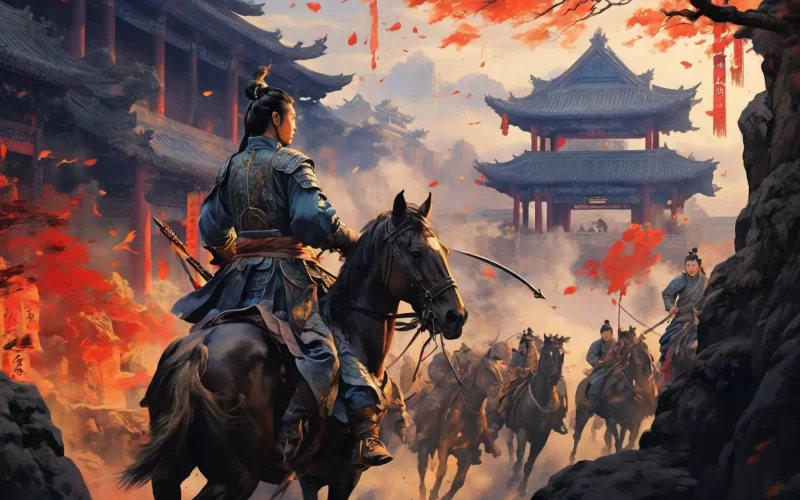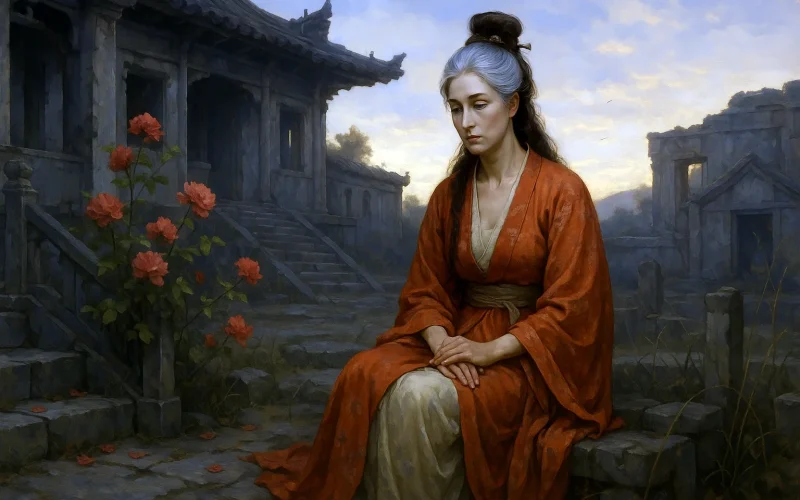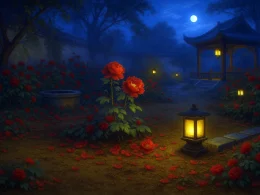I still remember those days of peace --
Twenty years among mountains and forests,
The pure stream running past my yard,
The caves and valleys at my door.
Taxes were light and regular then,
And I could sleep soundly and late in the morning-
Till suddenly came a sorry change.
…For years now I have been serving in the army.
When I began here as an official,
The mountain bandits were rising again;
But the town was so small it was spared by the thieves,
And the people so poor and so pitiable
That all other districts were looted
And this one this time let alone.
…Do you imperial commissioners
Mean to be less kind than bandits?
The people you force to pay the poll
Are like creatures frying over a fire.
And how can you sacrifice human lives,
Just to be known as able collectors? --
…Oh, let me fling down my official seal,
Let me be a lone fisherman in a small boat
And support my family on fish and wheat
And content my old age with rivers and lakes!
Original Poem
「贼退示官吏」
元结
昔岁逢太平,山林二十年。
泉源在庭户,洞壑当门前。
井税有常期,日晏犹得眠。
忽然遭世变,数岁亲戎旃。
今来典斯郡,山夷又纷然。
城小贼不屠,人贫伤可怜。
是以陷邻境,此州独见全。
使臣将王命,岂不如贼焉。
令彼征敛者,迫之如火煎。
谁能绝人命,以作时世贤。
思欲委符节,引竿自刺船。
将家就鱼麦,归老江湖边。
Interpretation
This poem was composed in the first year of the Guangde era (763 AD) under Emperor Daizong of Tang, during a period of internal strife and external threats that left the Tang dynasty politically unstable. At the time, the "Xiyuan Barbarians" rebelled against Tang rule, capturing several regions including Daozhou, Yongzhou, and Shaozhou. Yuan Jie, then serving as the prefect of Daozhou, witnessed the turmoil firsthand. Ironically, after suffering initial devastation, Daozhou was spared further attacks—not due to imperial defense, but because the rebels "took pity" on the impoverished citizens and withdrew voluntarily. Provoked by this revelation, Yuan Jie penned this searing indictment of official corruption and heartlessness with unadorned language, while affirming his own commitment to "retreat to the rivers and lakes, content in poverty and principle."
First Section (Lines 1-6): "昔岁逢太平,山林二十年。泉源在庭户,洞壑当门前。井税有常期,日晏犹得眠。"
Xī suì féng tàipíng, shānlín èrshí nián.
Quán yuán zài tíng hù, dòng hè dāng mén qián.
Jǐng shuì yǒu cháng qī, rì yàn yóu dé mián.
In peaceful years now past,
I dwelt twenty years in mountain solitude.
Springs flowed through my courtyard,
Ravines arched before my gate.
Taxes came at fixed seasons,
And I could sleep past dawn untroubled.
This opening section paints Yuan Jie's former reclusive life in strokes reminiscent of Tao Yuanming's pastoral idylls. The imagery of springs and ravines framing a self-sufficient existence ("sleep past dawn untroubled") carries subtle nostalgia for lost stability, contrasting sharply with the upheavals to follow. The measured cadence mirrors the orderly rhythms of pre-war rural life.
Second Section (Lines 7-14): "忽然遭世变,数岁亲戎旃。今来典斯郡,山夷又纷然。城小贼不屠,人贫伤可怜。是以陷邻境,此州独见全。"
Hūrán zāo shì biàn, shù suì qīn róng zhān.
Jīn lái diǎn sī jùn, shān yí yòu fēn rán.
Chéng xiǎo zéi bù tú, rén pín shāng kělián.
Shì yǐ xiàn lín jìng, cǐ zhōu dú jiàn quán.
Then sudden chaos came—
Years spent marching with armies.
Now governing this prefecture,
I face barbarian uprisings anew.
Our small city went unplundered,
Its poverty moving even raiders to mercy.
While neighboring regions fell,
This lone district stood spared.
Here the poem pivots to stark historical witness. The rebels' unexpected compassion ("poverty moving even raiders to mercy") serves as devastating irony, foreshadowing the coming condemnation of imperial officials. The parallel structure—neighboring regions' destruction against Daozhou's preservation—heightens the moral paradox.
Third Section (Lines 15-20): "使臣将王命,岂不如贼焉。令彼征敛者,迫之如火煎。谁能绝人命,以作时世贤。"
Shǐchén jiāng wáng mìng, qǐ bùrú zéi yān.
Lìng bǐ zhēng liǎn zhě, pò zhī rú huǒ jiān.
Shéi néng jué rénmìng, yǐ zuò shíshì xián.
These envoys bearing imperial decrees—
Are they not worse than bandits?
Those tax collectors,
Press men as if frying them alive!
Must one sever the people's lifelines
To be hailed as "a paragon of our age"?
The poem reaches its rhetorical climax in this blistering denunciation. The simile "as if frying them alive" ("press men") crystallizes the brutality of systemic exploitation. The rhetorical question—equating bureaucratic success with human devastation—tears away all pretense from state-sanctioned violence. Yuan Jie's voice here channels both Confucian moral outrage and Daoist distrust of coercive power.
Fourth Section (Final 4 lines): "思欲委符节,引竿自刺船。将家就鱼麦,归老江湖边。"
Sī yù wěi fújié, yǐn gān zì cì chuán.
Jiāng jiā jiù yú mài, guī lǎo jiānghú biān.
I long to cast aside my seal of office,
Pole my own boat away.
Take family to fish and harvest wheat,
And age by lakeside reeds.
The conclusion transforms protest into quiet resolve. The concrete actions—"pole my own boat," "fish and harvest wheat"—reject abstract moralizing for tangible withdrawal. Echoing Qu Yuan's defiant purity ("宁赴江鱼腹") while softening it into pastoral retreat, these lines embody the scholar-official's ultimate recourse when principle collides with power: self-exile into the enduring rhythms of nature.
Holistic Appreciation
The poem unfolds with clear structure and progression—beginning with recollections of peaceful times, transitioning to personal experiences of war, then rising to an indignant denunciation of corrupt officials, before culminating in a retreat to reclusive ideals. Rooted in the suffering of common people, the poet constructs his political critique through sober observation and impassioned conviction. Yuan Jie does not simplistically condemn bandits during the turmoil; rather, he exposes the absurdity that "bandits are lesser evils than officials," reflecting his profound compassion for the people and acute political insight. This is not merely a condemnation of reality but also a call for ideal governance.
Artistic Merits
- Unadorned, Natural Language: Free of excessive allusions or ornate phrasing, the poem carries weight in every word, achieving an organic, unforced quality.
- Moving, Truthful Narrative: Using a storytelling structure, it reveals social contradictions through personal experience, amplifying its emotional impact.
- Clear Progression, Layered Structure: The four sections interlock seamlessly, moving from the individual to the collective, from reality to ideals, demonstrating strong logic and expressive power.
- Lofty Vision, Deep Conviction: Balancing the pain of reality with the radiance of ideals, it embodies the poet's moral integrity amid chaos.
Insights
This poem conveys not just an ancient scholar's anger but also his deep concern for the people's fate and his commitment to political conscience. It reminds us that true virtue lies not in cunning stratagems or cold indifference but in empathy and a heart for humanity. Even in the most turbulent times, there must be those who stand up, speak truth, act justly, and uphold principles. The poet's dream of retiring to rivers and lakes is not passive escapism but a transcendence of fame—a return to humanistic ideals.
Poem translator
Kiang Kanghu
About the poet
Yuan Jie (元结, 719 - 772), a native of Lushan in Henan province, was a Mid-Tang poet and pioneer of the Classical Prose Movement. He earned his jinshi degree in 753 during the Tianbao era. His poetry, deeply concerned with the suffering of common people and opposed to ornate literary styles, aligns with the spirit of Yuan Zhen and Bai Juyi's New Yuefu movement. Regarded as a seminal figure in Mid-Tang realist poetry, his works bridge early social critique with the later populism of the "Yuan-Bai School."












